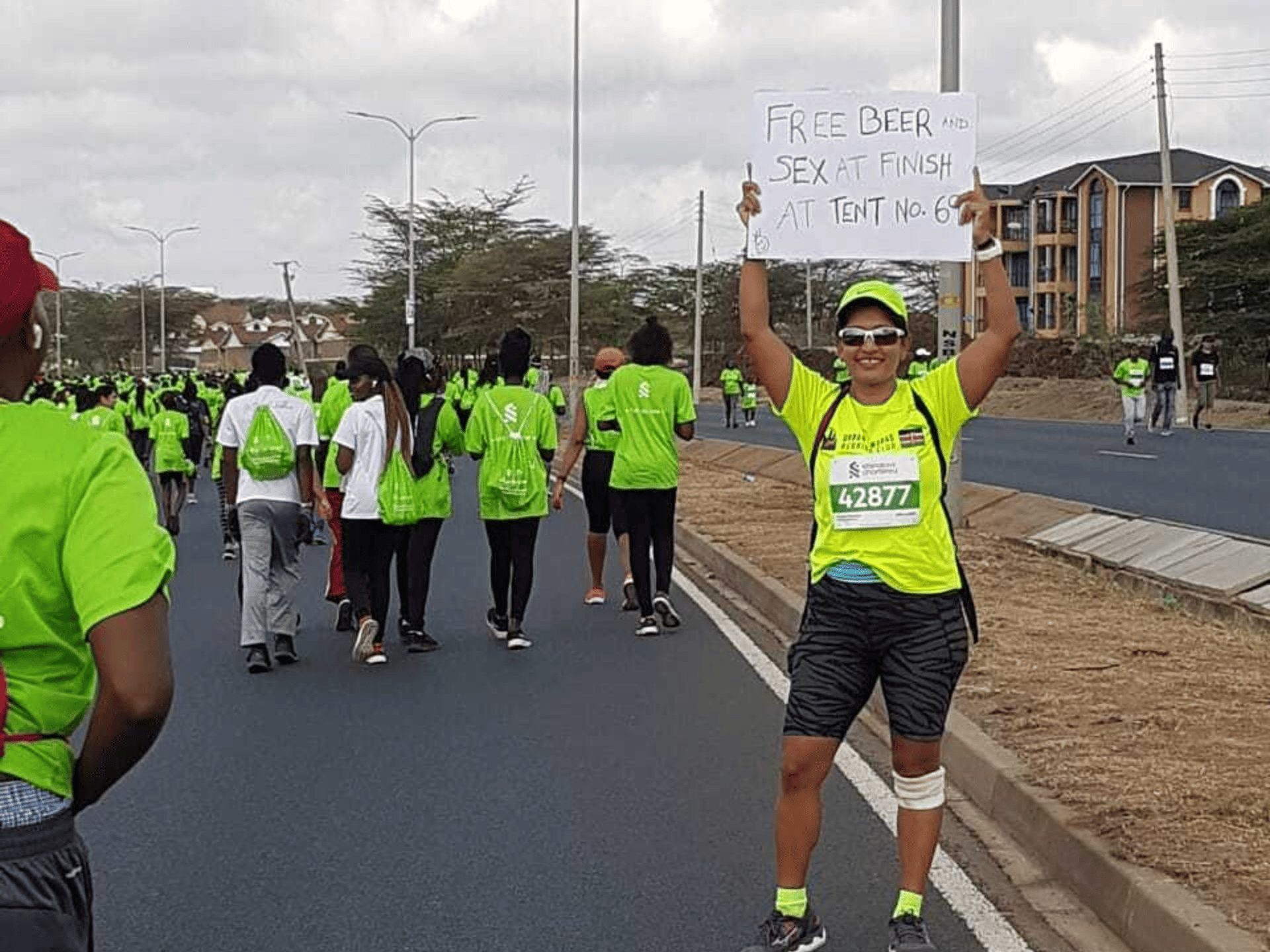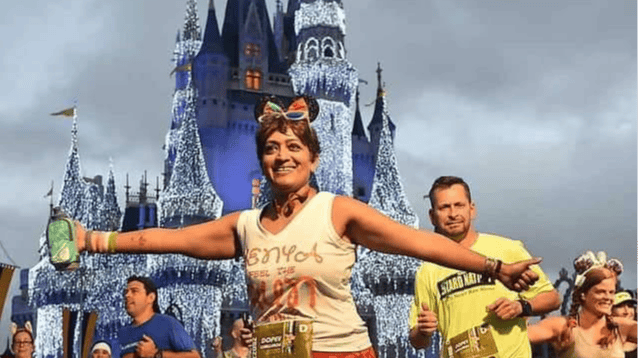Her first half marathon should have broken her.
“It was in Nairobi National Park, near the ivory-burning site,” Avani remembers. “We started almost at 10 in the morning. There was no water on the course.”
By the end, she was desperate. “I begged a policeman for his bottle of water. Other runners were asking me to share it. I’d give a sip—and they’d try to take the whole thing,” she recalls with a laugh.
The heat was merciless. After finishing, she and her husband went to Westgate Mall for lunch, only to spend the next hour in separate washrooms, sick from exhaustion. “We had overexerted ourselves completely,” she says. “It was crazy. That’s how it began.”
Even today, she rarely runs without water. “It scarred me mentally,” she admits. “Even for 40 minutes, I feel I need a bottle. I never want to relive that again.”
But somewhere in that awful race, something changed. “I had no plan, no fuel, no clue. Just stubbornness — and that poor policeman’s water bottle. Somehow I crossed in a respectable 2:27.
“I begged a policeman for his water bottle. Other runners were asking me to share it. I’d give a sip and they’d try to take the whole thing.”
Finding Her Tribe
For a year, Avani ran alone. “I didn’t know about running groups back then,” she says. Parklands Sunday runs gave her mileage but little connection.
That changed when she met two women at her husband’s gym.“They talked about running to Ngong as if it was no big deal. To me, that was god-level running. I thought, ‘No way I could ever do that.”
As she kept talking to them she learned that they also did the Kilimanjaro Marathon. That piqued her interest. It had never occurred to her that people could travel to another country just to run.
Through those conversations she discovered the Urban Swaras, then a small group of about 30 runners. “I’ve been a diehard Swara ever since,” she says with a smile.
The Swaras have a tradition of spotting potential. One day, after months of steady runs, the chairman told her, “You’re ready for 42.” Avani laughed it off at first — she was comfortable with half marathons. But his confidence in her got her thinking about a full marathon.

Avani is known for, among many other things, her naughty signs
From Halves to Fulls
In 2013, Avani had been running half marathons for years, but the thought of a full kept nagging at her. She resisted it. “I just couldn’t see it happening,” she recalls. She could hold her own in a half, but she wasn’t fast. “I wasn’t ready,” she told herself.
Then she met an American ultrarunner. Unlike most runners Avani knew, this woman didn’t care about time. She ran slow, steady, and unapologetic. “People will tell you not to try because of your pace,” she told Avani. “Ignore them. Just go out there and do it.”
“I figured if I could do Lewa, the rest would be easy. No fueling strategy. No program. Pure stupidity.”
That advice flipped something in her. If she was going to take on a full, she’d go big. She chose Lewa — one of the toughest courses in the country. “I told myself, if I can get through Lewa, then every other marathon will feel easier.”
Her training was a crash course: 10 weeks of short and long runs, some stretching. Her longest run was 26 kilometers, hardly enough in marathon-training terms. “I thought I was ready,” she says. “I wasn’t. Lewa kicked my butt.”
It took her five hours to finish. She crossed the line with an ITB injury that sidelined her for four months, the physio sessions a punishment of their own. Still, the finish carried meaning beyond her own medal. “After Lewa, a woman came up to me and said, ‘You looked like you were suffering, but you didn’t quit. That’s why I didn’t quit either.’ I thought, well, if my pain face can get someone else to finish, maybe that’s worth more than a medal.”

Avani celebrating with other Kenyans in Chicago
The World Opens Up
After Lewa, Avani began looking beyond the local races. “At first it was Standard Chartered, Lewa, Kilimanjaro. Then I saw friends traveling for races abroad, and I thought — maybe I could try that too.”
Her first World Major came in 2017 with London, where she earned a spot through charity fundraising. “I raised £2,500 selling toys and prams. That’s how I paid for London, Tokyo, and Berlin.”
London felt different from anything she’d done before. “This time I followed a program properly,” she says. She crossed the finish line in 4:54, then a personal best.
It was also in London that she stumbled onto her next big goal. At the finish, she noticed a man wearing two medals and went over to ask about them. “He told me one was the Six Star Medal, for runners who finish all six Majors. That was it — I knew what I was chasing next.”
From there, she began checking them off one by one: Berlin, Chicago, New York, Tokyo, and finally Boston. Each race left its own imprint. “London taught me discipline, Berlin gave me speed, New York was a party, Tokyo nearly froze my toes off, and Boston? Let’s just say my sub-three friend had finished, showered, and napped before I even hit the finish. That’s Boston for you.”
New York in particular stands out. “They have a parade of nations, like the Olympics. That year, I was chosen to carry the Kenyan flag. It was such an awesome feeling.”
The Six Star itself came after Boston. “You finish, get your normal medal, then go to the Abbott tent for the special one,” she explains. She laughs at the memory: “It was a bit of an anti-climax, given my sub-3 friend, fresh from his nap, was the only one who was there to witness this special moment. I finished all six in two calendar years. 2017 to 2019. It was insane.”

Avani wears a proud smile as the chosen flag-bearer at the NY marathon.
More Than Medals
For Avani, medals and finish lines are milestones, not the whole story. “People measure winning in minutes and seconds. For me, it’s dragging yourself out when the bed is warm, when your legs feel heavy, and finishing with a smile. If I can wave a cheeky sign along the way, even better. That’s my version of winning.”
Her outlook has shifted over time. In the beginning, running a full marathon was about proving something — mostly to herself. “I wanted to know that if I set out to do it, I could see it through. Even if I collapsed right at the finish line, at least I’d have made it.” What she didn’t expect was the ripple effect: people coming up to her afterward to say, “Because of you, I tried.”
Now in her 50s, Avani runs with longevity in mind. Speed doesn’t matter as much as consistency and joy. “I could push for fast times and risk injury, or I can go steady and enjoy another 20 years of running. That’s the choice I’ve made.”
From a 50-minute 5K to carrying Kenya’s flag in New York and earning the Six Star Medal, her journey shows that persistence — not talent or speed — is what carries her through. She sums it up simply: “I just keep showing up. Water bottle in hand, mischief in spirit.”
“I finished all six in two calendar years. 2017 to 2019. It was insane.”
Your Turn
There’s power in ordinary people doing extraordinary things. Your story might just be the one someone else is waiting to hear.
Do you have a story to share? Hit reply. Let’s keep this movement going—one run, one revelation at a time.


